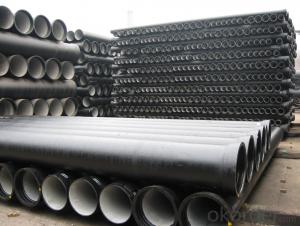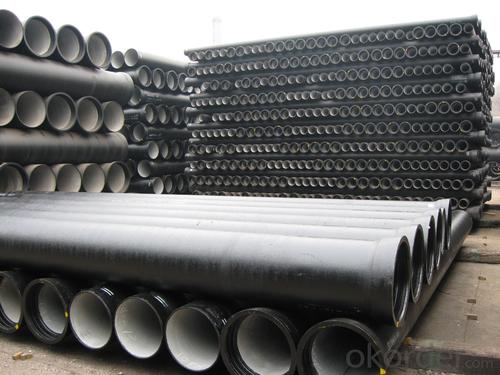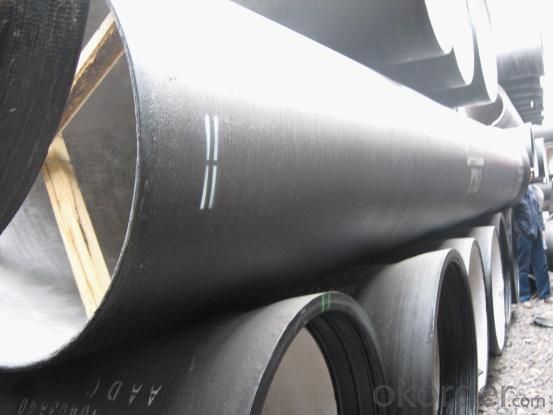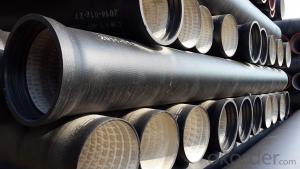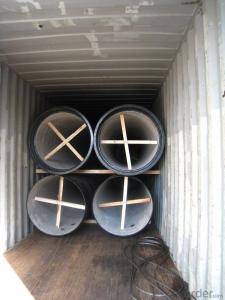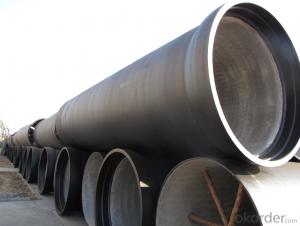Ductile Iron Pipe DN1000
OKorder Service Pledge
Quality Product, Order Online Tracking, Timely Delivery
OKorder Financial Service
Credit Rating, Credit Services, Credit Purchasing
You Might Also Like
Specifications
Quick Details
| Place of Origin: | China (Mainland) | Brand Name: | CMAX | Model Number: | T type / K type / Flange type |
| Length: | 6m / 5.7m / Negotiable | Standard: | ISO2531 / EN545 / EN598 | Application: | Potable / Sewage water |
| Diameter: | DN80~DN2200 | Shape: | Round | Hardness: | 230 |
| Pipe Wall Thickness: | standard | Pull Strength: | 420 | Yield (≥ MPa): | 300 |
| Material: | Ductile Iron | Type: | Centrifugal ductile cast iron pipe | Certification: | ISO2531 / EN545 / EN598 |
| Outer Diameter: | 80-2200 | Thickness: | standard | Specification: | DN80~DN2200 |
| |
The advantages to the customer:
Trustworthy financial strength.
One-stop shopping.
Fast and efficient service.
Coordination of shipments from multiple plants.
Specialists of the overseas shipping process.
A more competitive price.
- Q: Can ductile iron pipe be used for sewer and wastewater systems?
- Yes, ductile iron pipe can be used for sewer and wastewater systems. Ductile iron is a strong and durable material that can withstand the harsh conditions of sewage and wastewater transport. It has excellent corrosion resistance and can handle high-pressure environments, making it a suitable choice for these applications.
- Q: Ductile iron pipes perennial bubbles in the water will rot it
- From the hydraulic performance, because ductile pipe specifications generally refers to the inner diameter of PE pipe diameter specifications generally refers to the same specifications, because under the condition of ductile pipe can achieve greater runoff; from the installation and maintenance cost, ductile pipe have more favorable price. The inner wall of zinc spray, anti-corrosion materials such as cement mortar, ductile iron pipe perennial bubbles in the water will not be rotten.
- Q: What is the expected pressure rating of ductile iron pipes?
- The expected pressure rating of ductile iron pipes generally varies depending on the specific size, thickness, and application requirements. However, ductile iron pipes are known for their high strength and durability, allowing them to withstand high-pressure situations. Typically, they can handle working pressures ranging from 150 to 350 psi (pounds per square inch) or even higher, making them suitable for various water supply, wastewater, and industrial applications.
- Q: How much is the installation of cast iron pipe drainage 1 meters?
- Ductile iron pipes mainly called centrifugal ductile iron pipe, it has the properties of nature, iron and steel, excellent corrosion resistance, good ductility, good sealing effect, simple installation, mainly for municipal, industrial and mining enterprises, water supply, gas, oil etc..
- Q: What are the different methods for restraining ductile iron pipe?
- There are several different methods for restraining ductile iron pipe. These methods are used to prevent movement or displacement of the pipe due to internal pressure, external forces, or ground movement. The most common methods for restraining ductile iron pipe include: 1. Thrust blocks: Thrust blocks are concrete blocks or structures that are placed against the pipe at bends, tees, or other changes in direction. These blocks are designed to resist the forces exerted by the flowing water or other fluids within the pipe, effectively anchoring the pipe in place. 2. Mechanical restraints: Mechanical restraints, such as harnesses or clamps, are devices that are installed around the pipe and attached to a fixed structure, such as a wall or a concrete anchor. These restraints provide a physical barrier that prevents the pipe from moving or shifting. 3. Pipe restraints: Pipe restraints are devices that are directly attached to the pipe and anchored to a fixed structure. These restraints can include pipe clamps, pipe restraints, or pipe saddles. They are designed to securely hold the pipe in place and resist any movement or displacement. 4. Pipe bedding and backfill: Proper pipe bedding and backfilling is important for restraining ductile iron pipe. The pipe must be properly supported and surrounded by compacted material to prevent movement or shifting. This method involves carefully placing and compacting soil or other suitable materials around the pipe to provide stability and prevent displacement. 5. Trench walls: The walls of the trench in which the ductile iron pipe is installed can also provide some level of restraint. By properly compacting the soil against the pipe and ensuring proper compaction and stability of the trench walls, the pipe can be effectively restrained and prevented from movement. Overall, the different methods for restraining ductile iron pipe aim to ensure the pipe remains securely in place and does not experience any displacement or movement. The choice of method depends on factors such as the location, application, and the forces acting on the pipe. It is important to consult with engineers and follow industry guidelines and standards to determine the most appropriate method for restraining ductile iron pipe in specific situations.
- Q: What are the typical maintenance requirements for ductile iron pipe?
- The typical maintenance requirements for ductile iron pipe involve regular inspection, cleaning, and repair. Inspection is a crucial aspect of maintaining ductile iron pipe and should be conducted periodically to identify any signs of damage, corrosion, or leaks. This can be done through visual inspection, as well as the use of non-destructive testing techniques like ultrasonic or magnetic particle testing. Regular inspections help in detecting and addressing any issues before they escalate and cause significant damage. Cleaning is another important maintenance requirement for ductile iron pipe. Over time, sediment, scale, and other debris can accumulate inside the pipe, reducing its flow capacity and potentially causing blockages. Regular cleaning using methods like high-pressure water jetting or mechanical cleaning can help remove these deposits, ensuring optimal flow and preventing any issues related to reduced water flow or pressure. Repairing any damage or corrosion is an essential maintenance requirement for ductile iron pipe. If any cracks, leaks, or other forms of damage are detected during the inspection, prompt repair is necessary to prevent further deterioration and potential failure. Depending on the extent of the damage, repairs can include methods like welding, epoxy lining, or even replacement of the affected section of the pipe. In addition to these specific maintenance requirements, it is also important to implement a comprehensive maintenance program that includes preventative measures. This may involve measures like cathodic protection, which helps prevent corrosion, or the application of protective coatings to extend the lifespan of the pipe. Overall, regular inspection, cleaning, and repair are the typical maintenance requirements for ductile iron pipe. Adhering to these maintenance practices ensures the longevity, reliability, and optimal performance of the pipe system, minimizing the risk of failures and disruptions.
- Q: Are ductile iron pipes suitable for airport runway drainage?
- Yes, ductile iron pipes are suitable for airport runway drainage. Ductile iron pipes have excellent strength and durability, making them capable of withstanding heavy loads and extreme conditions, which are often encountered in airport operations. They are resistant to corrosion, which is crucial in a drainage system that may be exposed to various chemicals and environmental factors. Ductile iron pipes also have smooth inner surfaces, allowing for efficient flow of water and preventing blockages that could disrupt the drainage system. Additionally, they are easy to install and maintain, making them a reliable choice for airport runway drainage systems.
- Q: Can ductile iron pipe be used for hydropower systems?
- Ductile iron pipe is perfectly suitable for hydropower systems. It is renowned for its robustness, longevity, and ability to resist corrosion, making it an excellent option for numerous applications, including hydropower systems. The remarkable tensile strength of ductile iron enables it to endure the immense pressure and heavy loads associated with such systems. Additionally, its resistance to corrosion makes it ideal for use in water environments, ensuring a lengthy lifespan and minimal maintenance requirements. Consequently, ductile iron pipe can effectively serve hydropower systems by offering a dependable and efficient solution for water transportation and infrastructure support.
- Q: If the ductile iron pipe is broken, can we use rush repair?
- PE pipe repair section, as the name suggests, is a kind of used to repair the pipeline accessories. At present, the specifications of the repair section are: Phi 90, Phi 110, Phi 125, Phi 160, Phi 200, Phi 225, Phi 250, Phi 315 these specifications.
- Q: Can ductile iron pipes be used for submarine pipelines?
- Submarine pipelines can indeed utilize ductile iron pipes. Ductile iron, celebrated for its robustness and durability, proves suitable for a range of applications, including those submerged underwater. For decades, ductile iron pipes have been successfully employed in the construction of submarine pipelines. They possess the ability to endure the harsh conditions prevalent in underwater environments, such as corrosion, pressure, and shifting seabeds. Furthermore, ductile iron pipes display exceptional resistance to external loads, rendering them ideal for submarine pipelines that bear the weight of water and potential impacts. However, it remains imperative to consider factors such as coating, cathodic protection, and proper installation techniques to ensure the long-term performance and integrity of the submarine pipeline.
Send your message to us
Ductile Iron Pipe DN1000
OKorder Service Pledge
Quality Product, Order Online Tracking, Timely Delivery
OKorder Financial Service
Credit Rating, Credit Services, Credit Purchasing
Similar products
Hot products
Hot Searches
Related keywords
